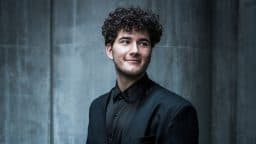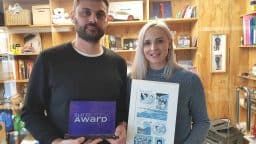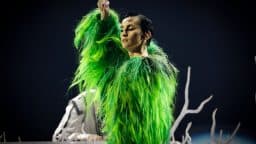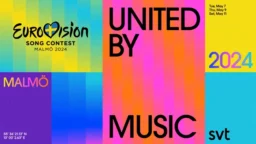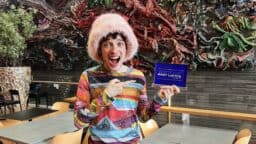Gjon’s Tears (stage name of Gjon Muharremaj, 1998) sings for Switzerland at the Eurovision Song Contest 2021 and is one of the favorites for the title. With Tout l’univers he wants to show everyone who is blown down by life how to get up again. We talked to him about the meaning of his song, about his starry eyes and about why he speaks so fast…
Ten years ago, at the age of eleven, you participated for the first time in a televized music competition, Albanians Got Talent. One year later you did the same in a Swiss tv-show. Then, in 2019, you were successful in The Voice France. Now it’s Eurovision. Many musicians say: Music has nothing to do with competition. But you seem to like that competitive element.
I do, totally. It’s not normal, ha ha, I must have a problem, maybe I’m a bit of a masochist. But the thing is, honestly: I just like the fact that I can challenge myself. The adrenalin, the fact that I know I can fail… It’s stupid, I know, because of course I can’t be perfect all the time, and I know that when I fail, it’s going to be all over YouTube – I’m not just casually singing at some bar in my village. The challenge is real. But I just like to challenge myself, and no competition is crazier than The Voice or Eurovision. How can you challenge yourself more than being at the most viewed music contest ever?
And what about the fact that all kinds of people will have an opinion about you?
What I do now comes from artists that I love, such as David Bowie, Grace Jones, Nina Hagen, Klaus Nomi –people that don’t care what others think. They did what they felt was their personal challenge, for instance: ‘I’m gonna wear make-up even if I’m a man and I don’t care if others critisize that.’ I so much prefer that attitude over always being in the same configuration, always piano and guitar, always the same music style, always the same outfit. For the same reason I love people trying out karaoke singing even if they are not good at it – I love people being unapologetic and just do the things they think are fun. I don’t think being safe my whole life is going to get me anywhere.
Can we spot this quality, this decision to be your own person, already in yourself as a thirteen year old, participating in Die grössten Schweizer Talente?
When I was thirteen years old, my gods were Bach, Beethoven and Mozart. That triangle – and Bach was on top. The first cd I got from my father was Bach. I didn’t understand anything about classical music, but it gave me all these feelings… Not in a romantic way, I wasn’t imagining sea shores or something, no – these songs were scaring me. It made me feel that there was a mouse gnawing in my heart. And it made me wonder how such a feeling could be created. It was so mystical. I know it’s not contemporary music, but I was so impressed by all these emotions. And by the discipline of the composers. When I read in a book that Beethoven, becoming deaf, sawed the legs off his piano and used the floor as a sounding board, so that he could lay his ear to the wooden floor and continue working, I thought: that is passion. You work on till the very end. Until you die. And maybe that will even be your cause of death, but then at least you gave your life for music. That’s what I want to do, too. And I think that thirteen-year old boy already wanted that as well. I thought to myself: I’m gonna do this, because one day I want to be as proud of myself as Mozart and Beethoven were.
Let’s talk about the intriguing lyrics of your song of this year, Tout l’univers . They are full of meaning. Can we pick two specific lines? The first one would be ‘Que deviendront nos souffles s’il restent sur le bord?’ which roughly translates as ‘What happens to our breaths when they stay at the shore?’
‘Souffle’ in French means ‘a gust of wind’, but it also means ‘breath’. But I have to contextualize this. When we started writing the song, we started in English. It was originally called Ground Zero. The idea was to speak about the idea of deconstruction-construction, about the new possibilities that follow after something is destroyed. I wanted to develop a few different things in the lyrics. As for the title, Tout l’univers… You know, we have an expression in French that means: you have to see beyond things. You have to be optimistic. With this song I wanted to stretch our view as far as I could, which means: into the whole universe. That’s why the song is called Tout l’univers and not, originally, Le point d’impact, which would be a translation of the English title Ground Zero.
And then ‘Ground Zero’ stands for…
Ground Zero could be interpreted like ‘the centre of the explosion’, although after September 11, 2001, the term also got a wider meaning. This expression, le point d’impact, doesn’t exist in French, so I wanted to translate it into feelings. Not in the negative sense, of it being an explosion, but I wanted to speak about the fact that when something is destroyed, there’s also the hope of rebuilding it. And rebuilding it in a better way. We should learn from our mistakes.
Do you think people do that, in general?
I’m not much into politics, but to me it always looks a bit like a game of ping pong: a new party wins and changes everything the old party did. In this song I wanted to say: bad things happen, but they give us the chance to make things better, in stead of trying to restore everything as fast as possible and pick up where we were before. And when I say ‘Que deviendront nos souffles s’il restent sur le bord?’ – oh, this is hard to explain. It’s a matter of feeling. Like the first lines: ‘Laisse le vent qui frôle sa main sur mon épaule – (I’m) letting the wind brush its hand over my shoulder’, which is like: I feel the wind touch me, the blow of wind that comes with an explosion. And right after you are in suspension. You are between the person you were before and the things that might come after. There are no thoughts anymore (‘le vide dans la tête – a void in my head’), you have no shelter (‘pas la moindre cachette’). It’s like a reality check. With this I wanted to say: ‘The explosion is now, and you have a choice: you can be dramatic about it, accept the explosion, give everything up and leave yourself like a piece of garbage on the floor, or you can fight against the storm that is in front of you. And I wanted to say: we are so strong. We are strong enough to save ourselves.
This is what we see in the video: a person in a car crash that turns around to help himself.
I wanted to have the ‘impact point’ in the video, and the cycle. The cycle of deconstruction-construction. That’s why the clip ends at the same point as where it started, as if to show that this is an eternal process. You know, there are concrete explosions, but people also have their own explosions. Like something with your family, someone who dies. And you have to understand that you have your inner power to fight those things. And to come back to that line: ‘Que deviendront nos souffles s’il restent sur le bord?’ is like: what becomes of our breaths? It’s a way of saying: what is going to happen? It’s so hard to explain everything, because this song is more a song that should be felt rather than understood. It’s not about something as simple as doing the groceries. I really wanted to create music and words and visuals that make people feel things. Because that’s what happened when I heard it for the first time: I felt it.
The lyrics ends with a question: ‘Comment soigner nos coeurs qui éclatent? – How do we take care of our exploding hearts?’ Isn’t the whole song an answer to this question?
The answer is indeed ‘tout l’univers’. The whole universe’. Even if things are hard now, because your heart feels completely dead after an explosion, there is still a whole universe to discover. There is still hope. And I also wanted to draw a parallel between space and time. The universe is so big, we can never see the totality of it. And that goes the same for our lives. Even if we have the feeling that we have experienced everything, we haven’t. So they way to take care of our hearts is to live on. And there will probably other explosions, but as I said, there are two ways to react: you either give up or you fight. Some people said: it’s a sad song. But for me it’s not; it’s a fighting song. A warrior song.
In what way is Tout l’univers related to Répondez-moi, the song you proposed last year?
With this song I didn’t want to go too far out of context. For me, last year is completely connected to this year. I wanted to keep the same energy. I didn’t want to come with an up-tempo song just because people said I should. You know, I’m the same person as last year. Of course I changed a bit, but not nearly as much as when I would have met thousands of people and would have lived through thousands of experiences and would have gone to thousands of places. I have been at home, like everyone else. And for me the most important values are sincerity and innocence. Innocence because it’s always important to try to discover new things. That’s why I wanted to become a teacher when I was younger. I was always so happy in school. I had starry eyes because of all the new things I learned. And it’s not that when you have lived seventeen years plus three hundred sixty five days, you suddenly – poof! – know everything there is to know, because now you are a responsible adult. When a child doesn’t know something, it just asks a question. And we should keep that same reaction when we are older. That’s what I mean by innocence.
And sincerity?
You could also call it authenticity. I want to stay true to myself. I want to show my kind of music and when they asked me to do Eurovision again this year, I said: ‘I really want to do it, with pleasure, because I don’t have the feeling I’ve lived the Eurovision experience.’ Making a song and posting a video: that’s the normal process for every artist. But what makes it different is the Eurovision life that is supposed to come with it. So I said yes, but my condition was: I want to write my own song. And they said: ‘Yes, we want you to write your song, because we believe in you.’ That was super cool. So that’s why I want to compete with Tout l’univers, after having a rhetorical song last year, with many questions without an answer, such as like: ‘Pourquoi je suis ici étranger, là-bas étranger? – Why am I a foreigner here as well as there?’. Tout l’univers is an answer to Répondez-moi. And my answer is: ‘Everything will explode, but you are going to rebuild things better than they were before. And that’s life.’
Can you take us back to the moment that you heard the song – just after Wouter Hardy and Nina Sampermans composed the first draft?
Before I met Wouter and Nina I had sent them a list of musical references, and some hints of things I wanted to hear in the song. Then we did a writing camp in Zürich with two studios and two groups of writers at the same time. That was not a good idea at all, and it wasn’t me who organised it like this. So, on the first morning, after talking a bit to everyone there, I started at the other team, because they were the guys I worked with for Répondez-moi. At the end of the morning I went to Wouter and Nina, and I listened to the song they were making. We actually filmed my reaction, I think we will release it at some point. So I heard the song and there were some lyrics, there was some lalala and there was a melody. And I was shocked by the fact that they understood me so well. At that moment I knew: this will be the Eurovision song.
But you wanted to compose your own song.
There were some things that we had to adapt. I changed some small parts of the melody, but when that was done I just couldn’t believe we had such a good result, with an almost finished production and with Nina’s voice. So I said: ‘This song is so beautiful. But I don’t think it’s for me. I think it’s for Nina.’ It was so well done that I feared that I maybe couldn’t fully identify with it. Normally I don’t give others in the writing process that much freedom. Normally I want to be take part in every step. But they really understood me. And I did feel it was a song that represented me. So after we had made some changes, we recorded my vocals and that afternoon we had the first version of the song.
Later on you worked on the French lyrics, together with Xavier Michel.
As I said, sincerity is one of my key values, so I wanted to feel comfortable with the song. The changes that we made in the English version had some very nice melodical effects, and maybe there are a bit less of these effects less in the French version. But lyrically it was more powerful for me to interpret it in French. So that’s why I wanted to include Xavier Michel, who worked on Répondez-moi. Also because we started the story together, and now we are continuing it together. But it’s weird, you know, because honestly… I’m a melody person. I love melodies more than I love lyrics – and then again… there are songs that I love just because of the lyrics, like David Bowie’s. So, for this song I had to choose between a melody effect in the English version or the French lyrics that would sound more powerful. And there was no debate for me. I’m not a singer of lyrics like ‘yeahhh, yeahhh,’ no, there must be a necessity inside yourself to say what you want to say. So that’s why I decided to do it in French.
What challenges do you see after Eurovision?
When people ask me: you did The Voice, then Eurovision, what is next? I always answer: I’m gonna sing on Mars. So what will I do to challenge myself after Eurovision? I don’t know, but I will find something. Maybe with an album. Maybe I’ll do a country song, since I love Shania Twain so much. I didn’t sing country before. By any means, the question will always be: what can I do to challenge myself?
Last question: how much of the teacher that you wanted to be is still in you?
Oh! There is still a teacher in me. Before corona I was also working as a vocal coach. I’m not a professor who teaches music, but maybe I have some experience that a normal music professor doesn’t have, like doing tv, working with cameras. And firstly, my pupils reminded me of how lucky I am, seeing the stars in their eyes when they dream of one day doing a show like The Voice. For example, I had this student. She had a child and thought she was too old to make music. And I told her that we’re never too old, that it’s a question of motivation, look at Morgan Freeman who started his career at fifty. And now she sings in a band, she is doing concerts, and I’m so proud that I could pass that passion on to someone else. My wish is, if I grow and become big, that I can create some kind of education structure here in Switzerland for modern music. We are big in classical and jazz music, but contemporary is not regarded as work, it’s seen as a hobby.
And don’t you think you’ll always stay a teacher in your lyrics, by asking all these important questions?
I’m always asking myself the same thing: why am I doing all these interviews? And why do I speak so fast? It’s because now you are listening to me. Maybe next year I’m nothing to you. And now that I have the opportunity to say things and to be heard, I want to say as many things as I can. And ask as many questions as I can.
Thank you very much – and we will be back in a year.
Deal.

